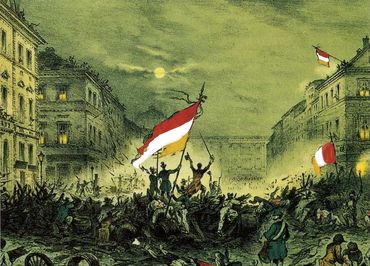April Revolution
| April Revolution | |
|---|---|
 The April 4 at Mevosa | |
| Historical context | |
| Date | April 8, 1808 |
| Place | Mevosa |
| Participants | Alphonse Matthada, Michael Towers, Manuel Del Paso, Francis Ghack, Nelson Thorley, Daniel Garçon, Jourdain Ilbert, Adam Crewe, Raymund Allard, Romuald De La Mesea |
| Causes |
British invasion Bayonne abdications |
| Outcome | |
| Previous government | Viceroyalty |
| Previous ruler | Esteban Cardenas Santander |
| Government resulting | National Assembly |
| Government resulting form | Government Junta |
The April Revolution was a week-long series of events that took place from April 1 to 8, 1808, in Mevosa, capital of the Vice-Royalty of The Yellow River controlled by Spain since 1535 and occupied by Great Britain in 1807. The result was the expulsion of both europeans empires and the establishment of a local government, the National Assembly on April 8. It was the first successful revolution in the Terra Nova and the trigger for the continental independence process.
The April Revolution was a direct reaction to Great Britain's invasion of Mevosa and Betham in september, 1807. Seeking new markets for his products, and access to the primary goods of Fluvique, the crown decided to take the low-defended colonies and secure the vital ports for his commerce. The Spanish authorities in Mevosa allowed the british troops to enter without fight and surrender the city, causing a major upset in the lower classes and caused the birth of many patriot movements across the country.
Initially the new british government declared the freedom of cult, the break of the monopoly with Spain and kept the spaniards in some institutions, for the status-quo. However, a group of local merchants, lawyers and military officials organized a series of meetings in a tobacco shop and formed a militia to repel the invaders. In the night of April 4 a popular uprising exploded and the patriot soldiers were forced to enter in action and finally besieged the british forces in the Mevosa's fort and made them surrender the next day. Despite the desires of some conservatives forces, the popular mood caused a new uprising, expelling the spaniards and establishing a patriot government, the National Assembly, composed by citizens of Mevosa and invited other provinces of the Viceroyalty to send delegates to join them. This resulted in the outbreak of war between the regions that accepted the outcome of the events at Mevosa and those that did not.
The April Revolution began the Fluviquean Independence War, although no formal declaration of independence was issued at the time, but the National Assembly acted in the name of the Yellow River peoples. As similar events occurred in almost all the others cities in the country, the April Revolution is considered the starting point of the Fluviquean national identity and the patriot movements around the continent. Historians today debate the different interests behind the revolution, between the merchants in revolt against taxes, the local military wishing better positions and the radical revolutionaries trying to accomplish a social change. A formal declaration of independence was finally issued at the National Congress in Alkanter on July 16, 1821.
